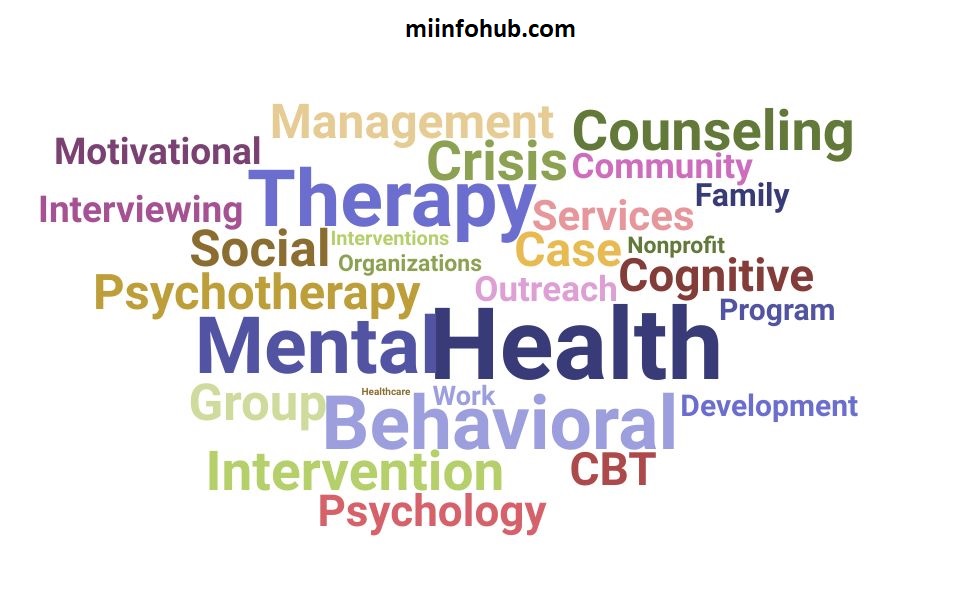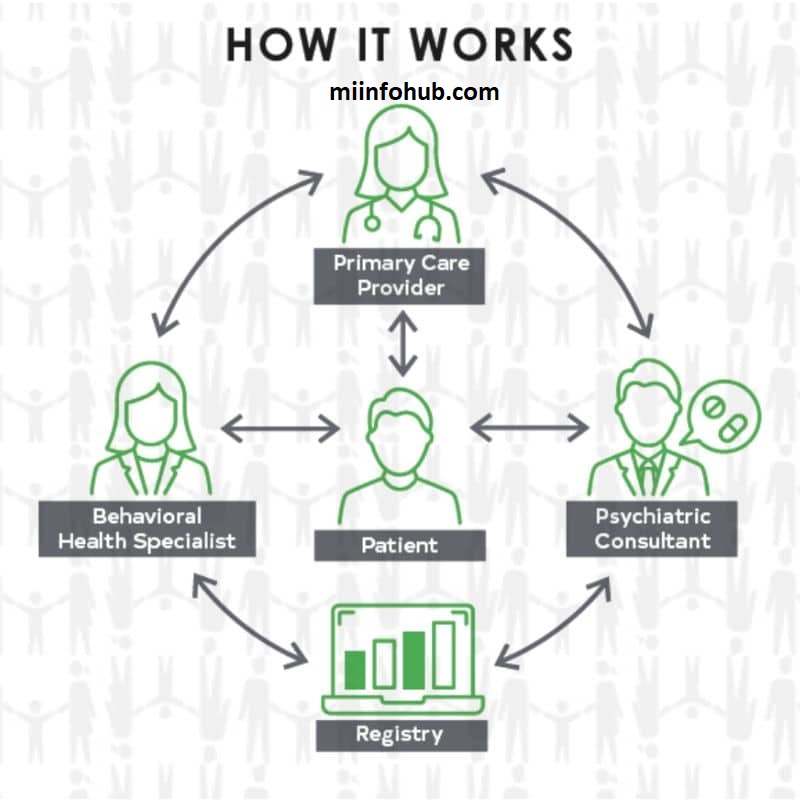Behavioral health specialists play a crucial role in supporting individuals struggling with mental health, emotional, and behavioral challenges. They work closely with clients to provide counseling, develop treatment plans, and monitor progress. If you’re passionate about making a positive impact on people’s lives and are interested in a fulfilling career, becoming a behavioral health specialist could be an ideal path. This guide outlines the key steps and qualifications required to pursue this meaningful profession and offers insights into what to expect in the field.

Understand The Role
A behavioral health specialist supports individuals dealing with mental health disorders, addiction, or behavioral challenges. Their role includes assessing patients, developing treatment plans, and providing counseling services. These specialists often work in settings such as clinics, hospitals, or rehabilitation centers, where they collaborate with doctors, therapists, and other mental health professionals to ensure comprehensive care for their patients. Their work is essential in helping individuals manage and overcome their challenges, contributing to overall well-being. If you want to know about strategic limited partners health insurance then click here.
Get A Relevant Degree
To become a behavioral health specialist, the first step is earning a degree in psychology, social work, counseling, or a related field. While a bachelor’s degree is often the minimum requirement, many employers prefer candidates with a master’s degree in a specific mental health discipline. This higher level of education can enhance your expertise and open doors to more advanced career opportunities within the field.
Gain Experience
Gaining hands-on experience is essential for becoming a behavioral health specialist. Many degree programs provide internships or fieldwork placements, allowing you to apply what you’ve learned in real-world settings. Volunteering at mental health clinics or community centers is another great way to gain practical experience. By working alongside professionals, you’ll develop a deeper understanding of the challenges and essential skills needed for this role.

Obtain Certification
In many states, becoming a behavioral health specialist requires certification or licensure. The requirements for certification vary, but they usually involve completing a relevant degree, accumulating supervised work experience, and passing a certification exam. One widely recognized certification is the Certified Behavioral Health Specialist (CBHS) credential, which validates your expertise and can increase job opportunities. Make sure to research the specific licensing requirements in your state to ensure you meet all necessary criteria.
Develop Key Skills
To excel as a behavioral health specialist, strong communication, empathy, and problem-solving skills are essential. You’ll need to manage stressful situations, understand complex human behaviors, and guide individuals toward healthier mental and emotional well-being. Being patient, compassionate, and adaptable will help you make a lasting impact in this rewarding field. These qualities, combined with professional training, will equip you to support those in need effectively.
Stay Updated
Mental health and behavioral sciences are dynamic fields, with new research and practices emerging regularly. To stay effective as a behavioral health specialist, it’s essential to stay informed. Attend workshops, conferences, and participate in continuing education programs. These opportunities will help you sharpen your skills, stay updated on the latest treatments, and ensure you’re offering the best care to your patients. Lifelong learning is key to thriving in this ever-evolving profession.
Find Employment
After completing your training and earning certification, you can begin applying for jobs. Behavioral health specialists are needed in a variety of settings, including schools, hospitals, rehabilitation centers, and private practices. Building a professional network through internships, field placements, and industry events can help you discover job opportunities more quickly. Additionally, joining professional organizations and job boards can further enhance your job search.

Consider Specialization
As you progress in your career, consider specializing in areas such as addiction, child psychology, or trauma therapy. Specialization not only enhances your expertise but also opens up more job opportunities and can lead to higher salaries. Advanced certifications and training in your chosen specialty can further strengthen your qualifications, making you a more competitive candidate in the job market. Additionally, specialization allows you to focus your work on the populations you are most passionate about serving.
Job Demand And Salary For Behavioral Health Specialists
The demand for behavioral health specialists is growing rapidly. As awareness of mental health issues increases, more individuals seek help, leading to a greater need for professionals in this field. According to the U.S. Bureau of Labor Statistics, employment for mental health counselors, a category that includes behavioral health specialists, is projected to grow much faster than the average for all occupations over the next decade. This trend is fueled by the rising focus on mental health, addiction treatment, and wellness initiatives.
Average Salary Range
The salary for behavioral health specialists can vary significantly based on factors such as location, experience, and work setting. On average:
- Entry-Level Positions: Specialists with little to no experience typically earn between $35,000 and $50,000 annually. These positions are often in community centers or clinics.
- Mid-Level Positions: With several years of experience, salaries can range from $50,000 to $70,000. These specialists may work in hospitals or specialized facilities.
- Experienced Specialists: Those with advanced degrees and significant experience can earn upwards of $70,000 to $100,000 or more, particularly in high-demand areas or specialized fields.
Geographic Variations
Salaries can also vary by location. States with a high demand for mental health services, such as California, New York, and Massachusetts, often offer higher salaries. Conversely, areas with fewer resources may have lower average salaries but can offer unique opportunities to make a significant impact in underserved communities.
Behavioral Health Specialist vs Mental Health Counselor
| Category | Behavioral Health Specialist | Mental Health Counselor |
|---|---|---|
| Role | Focuses on mental health, addiction, and behavioral disorders. | Primarily addresses mental health and emotional well-being issues. |
| Education Requirement | Bachelor’s or Master’s degree in psychology, social work, or related field. | Master’s degree in counseling or psychology. |
| Certification/Licensing | Certified Behavioral Health Specialist (CBHS) or state-specific certifications. | Licensed Mental Health Counselor (LMHC) or equivalent. |
| Treatment Focus | Treats both mental health and behavioral issues, such as addiction. | Focuses on therapy for emotional and psychological problems. |
| Workplace | Clinics, hospitals, rehabilitation centers. | Private practices, community centers, schools. |
| Approach | Uses a holistic approach, addressing behavior and mental health. | Primarily focuses on counseling and therapeutic interventions. |
| Client Interaction | Works with individuals on behavior modification and addiction recovery. | Helps clients with emotional regulation, stress, and trauma. |
| Job Demand | High demand due to growing focus on behavioral health services. | Strong demand, especially in areas with limited mental health services. |
Typical Workplaces For Behavioral Health Specialists
Typical Workplaces for Behavioral Health Specialists
Behavioral health specialists work in various environments, each offering unique opportunities and challenges. Here are some common workplaces for these professionals:
Hospitals
Hospitals often employ behavioral health specialists to provide care in emergency rooms or inpatient psychiatric units. Here, specialists assess patients with acute mental health crises, develop treatment plans, and coordinate with medical staff for comprehensive care. They may also conduct group therapy sessions and provide individual counseling.
Outpatient Clinics
Outpatient clinics are a primary workplace for many behavioral health specialists. These settings offer therapy and counseling services to individuals dealing with mental health issues or substance use disorders. Specialists work with clients on a scheduled basis, providing ongoing support and treatment. They may also collaborate with other healthcare providers to ensure holistic care.
Rehabilitation Centers
Behavioral health specialists in rehabilitation centers focus on treating individuals with substance use disorders. In these settings, they develop personalized treatment plans, facilitate group therapy sessions, and support clients through the recovery process. They play a crucial role in helping clients build coping strategies and reintegrate into their communities.
Schools
Schools employ behavioral health specialists to support students facing emotional and behavioral challenges. In educational settings, specialists work closely with students, teachers, and parents to address issues such as anxiety, depression, and learning difficulties. They may conduct assessments, provide counseling, and implement intervention programs to promote mental well-being in students.
Private Practices
Some behavioral health specialists choose to work in private practice, offering personalized therapy and counseling services. In this setting, specialists can tailor their approaches to meet individual client needs. Private practice allows for greater autonomy, flexibility in scheduling, and the ability to specialize in particular areas of mental health, such as trauma or family therapy.
Community Mental Health Centers
Community mental health centers provide accessible care to individuals in underserved areas. Behavioral health specialists in these centers offer a range of services, including counseling, crisis intervention, and case management. They often work with diverse populations, addressing cultural and socioeconomic factors that impact mental health.
Corporate Settings
Some behavioral health specialists work in corporate environments, focusing on employee wellness programs. In this role, they may provide counseling services, conduct workshops on stress management, and develop initiatives to promote mental health in the workplace. This setting allows specialists to support employees’ well-being while also addressing workplace-related issues.

Challenges And Rewards Of Being A Behavioral Health Specialist
Challenges
- Emotional Strain
Working with individuals facing severe mental health issues can take a toll on specialists. They often hear painful stories and witness struggles, which can lead to compassion fatigue or burnout if not managed properly. - Difficult Cases
Some clients may resist treatment or show minimal progress, creating frustration. Specialists must navigate crises, such as suicidal ideation, requiring quick thinking and a calm approach, adding to the pressure. - High Workload
Many behavioral health specialists face heavy caseloads, making it challenging to provide quality care. Balancing multiple clients, paperwork, and administrative tasks can lead to feelings of overwhelm. - Stigma
Despite increased awareness, stigma around mental health persists. Specialists may encounter resistance from clients or families, complicating treatment efforts and impacting willingness to seek help. - Compliance and Regulations
Navigating healthcare regulations and insurance requirements can be daunting. Specialists must stay informed about policies, billing practices, and legal considerations, which can detract from patient care.
Rewards
- Transforming Lives
Helping clients overcome mental health challenges and achieve their goals is profoundly fulfilling. Specialists witness positive changes, reinforcing the value of their work. - Building Connections
Establishing trusting relationships with clients offers a supportive presence in their lives. These bonds can be life-changing, providing clients with a safe space to express themselves and seek guidance. - Promoting Awareness
Specialists can advocate for mental health awareness and reduce stigma. Educating others contributes to a more compassionate society, leading to broader changes in how mental health is perceived. - Personal Growth
Facing challenges often leads to personal growth. Specialists develop skills like empathy and problem-solving, enhancing both their professional abilities and personal lives. - Job Satisfaction
Many specialists report high job satisfaction. Knowing their work helps individuals lead healthier, happier lives provides a sense of purpose and fulfillment that can outweigh the demands of the job.

Online Programs And Continuing Education For Behavioral Health Specialists
Online Programs
- Degree Options
Many universities offer online degrees in psychology, social work, and counseling. These programs provide flexibility for working professionals. Students can pursue bachelor’s, master’s, or even doctoral degrees at their own pace. - Certification Programs
Online certification courses, such as Certified Behavioral Health Specialist (CBHS), are available. These programs focus on key skills and knowledge necessary for success in the field, making it easier to obtain certifications while working. - Webinars and Workshops
Numerous organizations host online webinars and workshops covering various behavioral health topics. These sessions allow specialists to learn about new techniques, research findings, and best practices without leaving their homes.
Continuing Education
- Importance of Lifelong Learning
The field of behavioral health is always evolving. Continuing education helps specialists stay updated on the latest research, treatments, and industry standards, ensuring they provide the best care. - Accredited Courses
Many professional organizations and universities offer accredited continuing education courses. Completing these courses can earn specialists necessary continuing education units (CEUs) to maintain licenses and certifications. - Networking Opportunities
Continuing education events often provide networking opportunities. Specialists can connect with peers, share experiences, and learn about job openings or collaborative efforts in their communities. - Specialization Training
Many continuing education programs offer training in specialized areas like trauma-informed care, addiction counseling, or child psychology. Pursuing these specializations can enhance expertise and open up new career paths. - Online Resources
Numerous online resources are available for behavioral health specialists. Websites, forums, and online communities provide access to articles, research papers, and discussions on current trends in mental health.
Conclusion
Becoming a behavioral health specialist is a fulfilling career choice for those who want to make a difference in mental health. This role allows you to positively impact individuals facing emotional and psychological challenges. By following these steps—earning the right degree, gaining hands-on experience, obtaining necessary certifications, and committing to ongoing education—you can build a successful career in this growing field. Additionally, the demand for behavioral health specialists continues to rise, offering numerous job opportunities across various settings. Embracing this path not only enhances your professional growth but also contributes to the well-being of your community.

